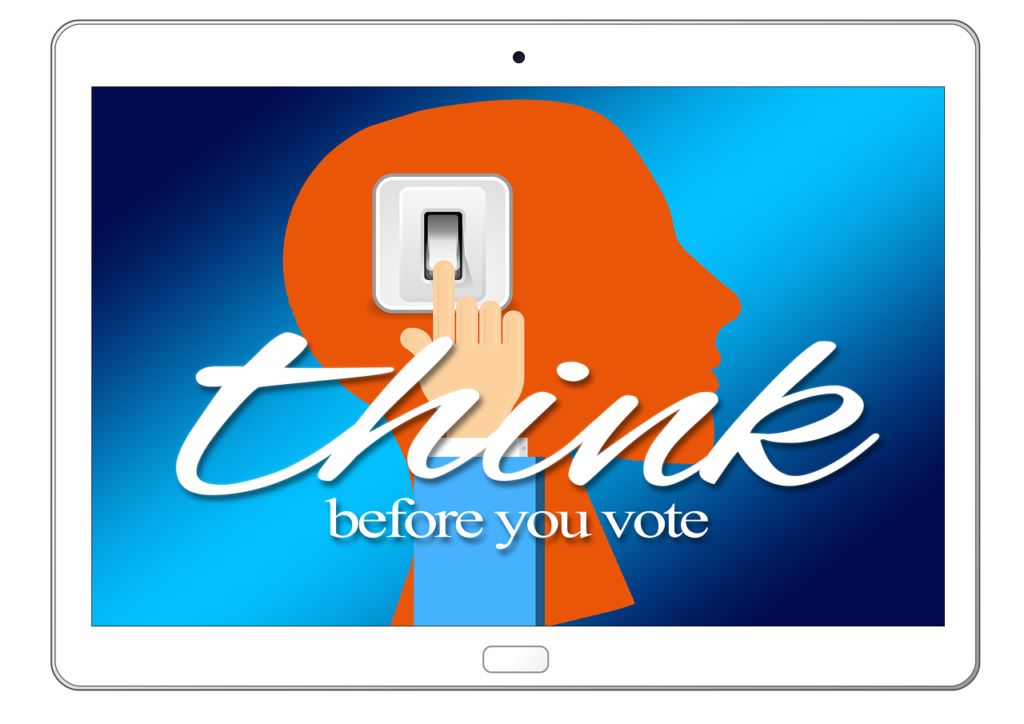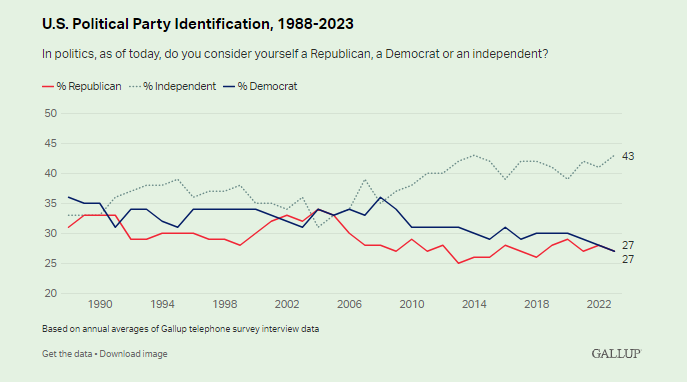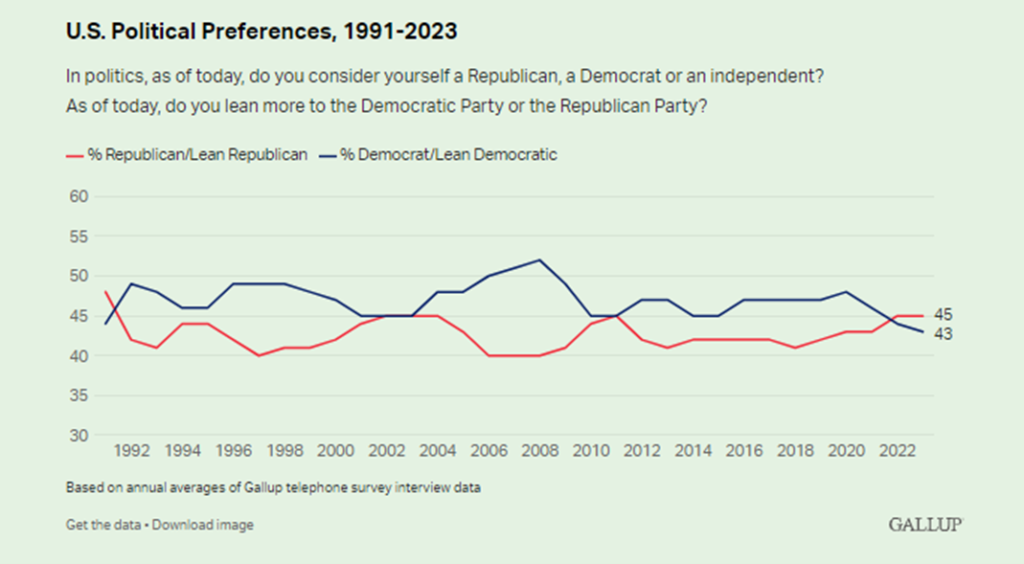
(Part 1 of a 2-Part Series)
Independent voters will likely tip the scales in the November presidential election. You have an outsize role in one of the most consequential elections in American history. It could very well be the most important vote of your life.
The candidates and their political parties are focusing on you with laser precision. In the coming months, expect to be increasingly bombarded with hyper-partisan narratives. All-too-often these narratives will provoke, fearmonger, falsely accuse, misinform, overpromise, and outright lie. Some of them will also groundlessly undermine our trust in government and paint the picture of a country in decline. Finally, many of the messages will be microtargeted to you, based on your political leanings, personal hot button issues, television viewing habits, and even music preferences.
I don’t join this partisan fray in trying to persuade you to vote for Biden, Trump, or anyone else. Rather, I want to talk with you about this onslaught of narratives and the importance of separating the truth from all the misinformation, false accusations and outright lies. I want to help you sort through all the hyper-partisan and messaging so that you can decide the facts and the truth for yourself.
It’s a heavy lift, but what better way is there to prepare you for casting the most consequential vote of your life? A full understanding of when you’ve been told the truth or lied to and misled also allows you to hold candidates and political parties accountable for what they’ve been saying. Those who consistently use falsehoods and misinformation to divide us and undermine trust in America simply don’t deserve our votes.
More and more Democrats and Republicans have left their parties to join you as an independent.
As of 2023, 43% of Americans join you in identifying as independent (or “unaffiliated”). Independents far exceed the percentages of those who identify as Republican (27%) or Democrat (27%). As you can see from the Gallup data below, your ranks have been steadily growing, while those identifying as Democrat or Republican have been shrinking.

I probably don’t need to tell you what research says about this exodus. Most of you left your party because you became disillusioned with our 2-party political system. I join you in this conclusion. Our system is ineffectual, overly partisan, and divisive. In fact, the vast majority of Americans (86%) believe that Republicans and Democrats are more focused on fighting one another than on solving problems.
Countless public opinion polls reveal that Republicans and Democrats blame one another for problems facing the country. Our practice is to blame the other party, stoke anger and fear, attempt to gain control of government, and then impose our solutions.
An Economist/YouGov poll (March 2022, see Tables 98A and 98B) indicates that 62% of independents have a very unfavorable (43%) or somewhat unfavorable (19%) view of the Democratic party. Also, 63% of independents have a very unfavorable (40%) or somewhat unfavorable (23%) view of the Republican party. In short, you don’t think much of either party.
Even though you’re fed up with our hyper-partisan and dysfunctional politics, the Republican and Democratic parties continue to dominate policymaking and control who is elected to office.
While tens of millions of you identify as independent, America doesn’t really have a viable and competitive “Independent Party.” The Independent Party that does exist is small in scale. It doesn’t have the resources or political clout to run candidates and gain control of government. Instead, the Republican and Democratic parties dominate by controlling candidates, campaign financing, and political platforms and messaging. Policymaking by Congress is largely controlled by the two parties through control of leadership, as well as through rewards and punishments meted out to party members.
The two parties have an obvious interest in maintaining control and zero interest in promoting or allowing a competitive “Independent Party.” Moreover, each of the two parties have a vested interest in gaining control of government, enacting their policies, and preventing the opposing party from doing the same. It’s no wonder there is so much division and hyper-partisan behavior in our politics.
Because the Republican and Democratic parties continue to dominate, most of you continue to lean Republican or Democrat.
It is understandable that many of you retain your partisan leanings despite not identifying as Republican or Democrat. You have no home in a formidable party with its own positions, platform, and power. Instead, the Republican and Democratic parties have all of the power and control. The media—especially cable television and social media—is preoccupied with Democrat versus Republican differences and disputes. While you are fed up with the constant fighting and division, you still get drawn into policy disputes because of your opinions and views. Inevitably, it’s hard to escape leaning Democrat or Republican.
Not surprisingly, when Americans are asked about their political party, most continue to identify with one of the two parties. The Gallup data below shows that 45% of Americans currently identify as Republican/lean Republican, and 43% identify as Democrat/lean Democratic. In terms of leaners, 15% of voters lean toward the Republican Party and 16% lean toward the Democratic Party.

Other research shows that some 80-85% of independents typically support a specific party and specific kinds of candidates again and again.
Because you aren’t wedded to a political party, and because you’re fed up with both parties, you tend to vote for individual candidates rather than adhere to the party line.
Independents are hardly homogeneous. You not only lean Democrat or Republican, but some of you are anti-party. Some of you are “double haters” who aren’t happy with choosing either Trump or Biden. Also, some of you are simply uninvolved when it comes to politics. What most of you have in common is that you are fed up with the fighting and partisan squabbling, and you tend to vote for individual candidates rather than adhere to the party line. Political scientists thus describe you as “free agents” and “hard to typify.” For example, in 2012, a majority of independents voted for Barack Obama; they backed Donald Trump in 2016; and then shifted to Joe Biden in 2020.
When you vote in November you have two options: you can summarily back the candidate who will pursue the agenda and positions of the party you lean to; or you can take a more rigorous approach and vote based on the veracity of what the candidates and parties have been saying to you in their narratives.
In the coming months the bombardment of narratives from the candidates and parties will be relentless. You’ll be told how evil, corrupt, and failed the opposing candidate and political party is. Many of the messages arriving in your mail, email, social media feed (and even those knocking at your door) will be microtargeted to you based on your hot button issues. You’ll be implored to vote for a presidential candidate so that he can enact his agenda and wipe out all the bad actions and policies of the other candidate and party. You’ll be entreated to choose one side over the other. And, unfortunately, many of the communications will stretch the truth, mislead, and even outright lie.
In the face of this barrage, one option is to summarily choose sides. You can simply decide your vote based on the narratives of the candidate and party you lean to. You stay within your current echo chamber, ask few questions, and shrug off that you’ve been microtargeted. In essence, you embrace the messaging of the candidate and party you lean to and you largely reject the agenda and messaging of the other candidate and party. You want your candidate to fulfill his promises and impose his agenda. You might even support expanding his powers as necessary to accomplish these ends.
The second option is to take a more rigorous and difficult approach in deciding your vote. This involves choosing your candidate by sorting through and validating the respective narratives of the candidates and their political parties. You decide you’re not going to get sucked into choosing sides and perpetuating the battle of political parties and candidates. You’re not going to just go along with the microtargeted messages designed to gain your vote. Instead, you’re going to systematically review and validate all the key narratives of the political parties and candidates. You’ll decide for yourself whether the particular narratives are true, false, misleading, or unfounded. And you’ll decide for yourself the effect the narratives have on thwarting bipartisan cooperation and solutions, dividing the country, and undermining trust in government. This hard work will enable you to take control over your choice for President.
Summarily choosing sides will only perpetuate our hyper-partisan and broken system; while taking a more rigorous approach will enable you to choose the better candidate and be a change agent for reform.
While the option of summarily choosing sides is expedient, it will only perpetuate our hyper-partisan and broken system. Most Americans, especially independents, want just the opposite. Let me explain with some examples.
Say you are an independent who leans Republican–mostly because of the economy and illegal immigration–and that you rely on Fox News for information about politics. It is extremely likely you would choose to vote for Trump because you would be seeing and hearing that Biden has been a disaster on the economy and illegal immigration. Fox News would be reinforcing Trump and Republican party narratives on these matters and ignoring or rebutting everything else.
On the other hand, assume you are an independent who leans Democratic–mostly because of lack of opportunity for the poor and increasing restrictions on abortion–and that you rely on MSNBC. It is extremely likely you would choose to vote for Biden because you would be seeing and hearing that Trump protects and favors the rich, orchestrated the repeal of Roe v. Wade, and will push for further limits on abortion. MSNBC would be reinforcing Biden and Democratic narratives on these matters and ignoring and rebutting everything else.
It’s not a surprise that basing one’s vote on party leanings and the accompanying narratives of one candidate only perpetuates our current system. Candidates and their parties have long been guilty of concocting narratives that are deceptive, condemning, alarmist, one-sided, unfounded, and outright lies. The narratives are more about creating differences–good versus evil–rather than stating the truth or attempting to find middle ground. Endless repetition of these narratives moves the needle on public opinion, regardless of truth. Through endless repetition of lies, we come to believe them. Voters are deceived and manipulated to serve the ends of winning elections and gaining control.
Once in control, the victorious candidate and party push to enact their agenda over the opposition of the losing side. Policies of the opposition are repealed and repudiated. But the victorious candidate and party can only do so much unilaterally. As a result, our political parties and candidates spend most of their time and energy gaining short-term victories that are resisted and overturned as soon as the opposing party gains the upper hand. This broken system has not produced much real progress on major problems. For proof, just think about key policy issues such as the skyrocketing national debt, abortion, gun control, illegal immigration, crime, and health care. These issues remain unresolved because the parties just want to fight instead of finding middle ground.
On the other hand, taking a more rigorous approach will enable you to choose the better candidate and send a message to political parties and candidates. You’ll tell them that truth and solving the country’s problems matter. By systematically reviewing the narratives of both candidates and both political parties you take control of what you decide is true. You’ll learn when you have been lied to, deceived, or manipulated. You’ll also gain valuable insight into the problems themselves as well as solutions. You can decide your vote based on a comprehensive review of all the problems and the respective narratives.
Here’s an example of taking the more rigorous approach on one of the narratives regarding the economy: high inflation.
To illustrate the more rigorous approach let’s take the problem of high inflation. You start by reviewing and validating the Trump/Republican narrative that Biden is responsible for record high inflation that is causing most Americans to suffer. You’ll also review and validate what Biden and the Democrats are saying about this matter. Since I have recently completed this research, let me summarize what you’d find.
While inflation indeed reached a very high level in June 2022 (9.2%), the real issue is whether this inflation was caused by Biden’s actions. Trump/Republican narratives say Biden is responsible because of too much reckless spending, especially with the American Rescue Plan Act. However, research shows that inflation rates were very high in most countries of the world in June of 2022. This suggests there were worldwide factors affecting inflation. Indeed, research tells us that there were major supply chain problems around the world that added to inflation. Russia’s February 2022 invasion of the Ukraine was also a factor. In addition, there were at least two major stimulus packages enacted during Trump’s tenure, including one in December 2020, that provided trillions in authorized spending into 2021, 2022 and later. Research also tell us that during 2022, 2023 and beyond, many major US companies racked up record profits in selling groceries, gasoline, energy, and other consumer items. Finally, research tells us that a President can’t directly control or reduce the inflation rate; rather, the Federal Reserve acts on inflation through its authority to adjust interest rates.
By researching the narratives we thus arrive at a more sophisticated understanding. Biden was not the sole or primary cause of high inflation. Rather, worldwide supply chain issues, Russia’s invasion of Ukraine, spending during Trump’s term (including record National Debt), and profiteering by American businesses also contributed. Blaming Biden for not immediately reducing inflation is also unfounded. The Federal Reserve, and not the President, has control regarding this matter. The Fed has adjusted interest rates, cooled the economy, and brought down the rate of inflation. Also, to solve the problem we must also get at profiteering by American businesses. Finally, we should also recognize that worldwide events such as wars, pandemics, and economic collapses are beyond the control of the President and the federal government. Sometimes we just have to ride out the harsh economic effects of such events.
By reviewing and validating all the key narratives of both candidates and political parties you can determine for yourself whether they are true, misleading, unfounded, or patently false. You can assess the extent to which they have misled pubic opinion and diminished trust in government and our institutions. You can gain insight into the problem and its solution, as seen from the discussion on inflation above. You can also draw conclusions about whether the authors of the narratives deserve your trust, your vote, and your campaign contributions.
To help you with the daunting task of examining narratives, I’m offering a summary of my ongoing research.
Critically examining all the key narratives from Trump, Biden, and their respective parties is a task that could literally take hundreds of hours. I suspect that most of you don’t have this kind of time, and many of you may lack the research background. Accordingly, as a jumping off point, I’m offering a summary of my work in Part 2 of this series. For ease of understanding, I organized the narratives into ten major issue areas. My summary is based on years of research, blog writing, and teaching regarding our broken hyper-partisan political system. After reviewing this analysis, you should have a base of understanding that will enable you to come to your own conclusions as you encounter these and other narratives in the coming months.
Finally, in taking the more rigorous approach, it’s important to review and open up your echo chamber. Knowingly or unwittingly, each of us has developed an echo chamber that tends to reinforce our political beliefs and leanings. This leaves us less exposed to conflicting information and less able to objectively evaluate narratives. For example, if you lean Democrat and rely exclusively on MSNBC, you won’t be able to objectively evaluate the narratives. Nor can you be objective if you lean Republican and rely exclusively on Fox News. Here’s a blog post that can help you with understanding and opening up your echo chamber.
Choosing the rigorous approach is the right choice for both you and America.
America needs each of us to cast the most informed vote of our life in November. Let’s take the rigorous approach and tell our candidates and political parties that truth matters. Let’s vote based on weighing all the issues and the veracity of what candidates and parties have been telling us. Let’s send the message that we’re done with hyper-partisan narratives that lie, mislead, falsely or groundlessly accuse, fearmonger, divide, and undermine trust in our government and country. Let’s take control of the most important vote of our lives.
Leave a Reply